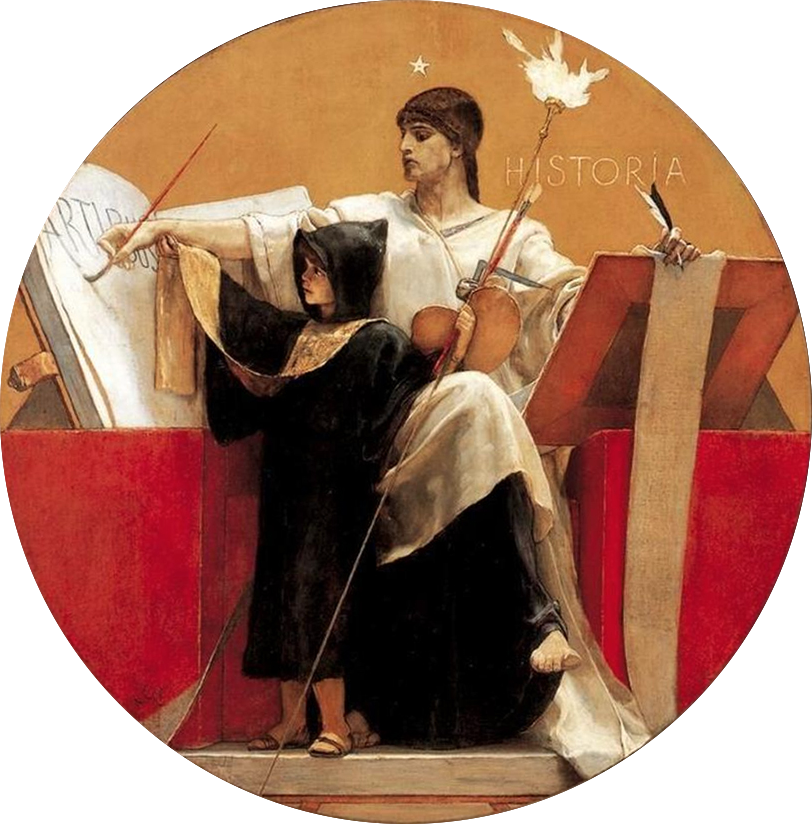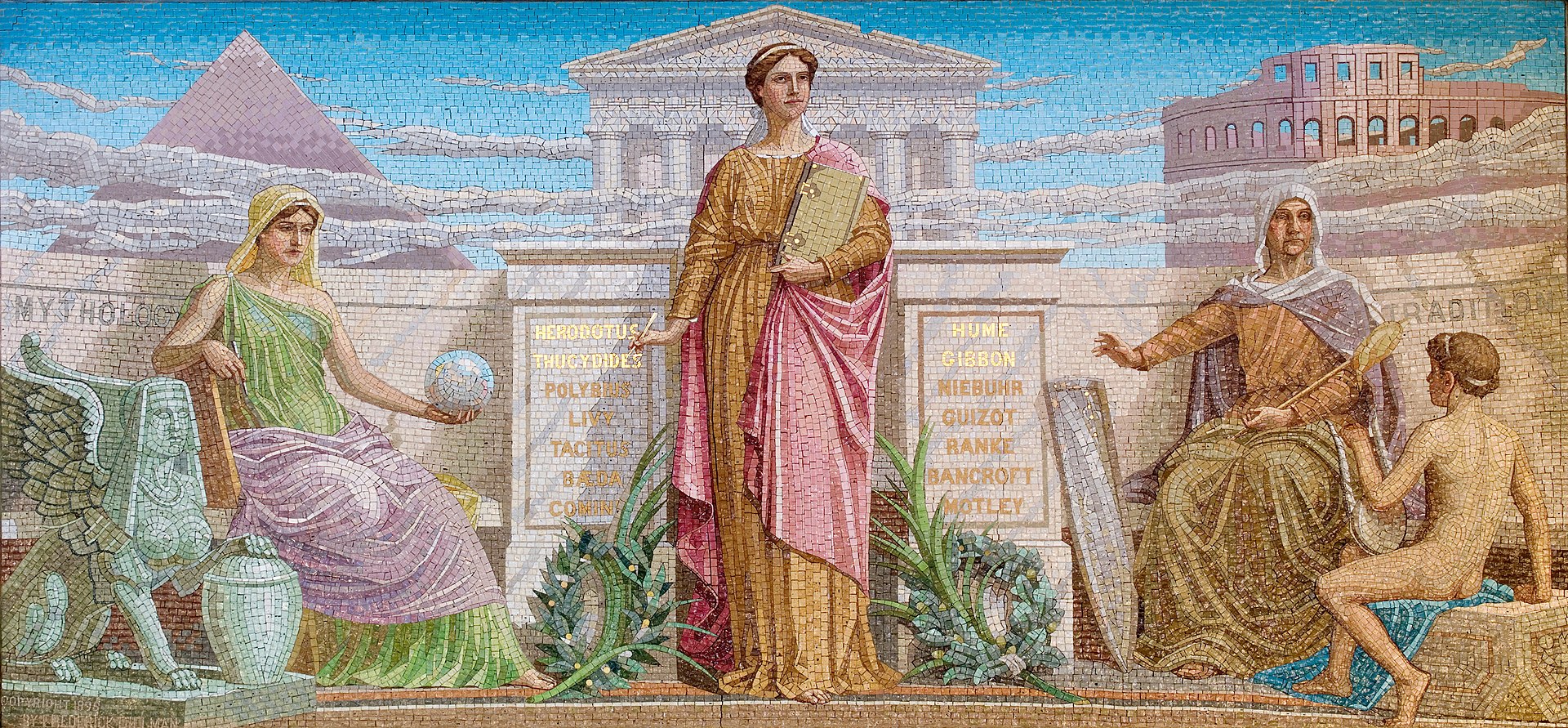
歴史
History, Geschichte
Historia, Allegorie der Geschichte, Gemälde von Nikólaos Gýzis (1892)
☆ 歴史学(れきしがく、英: History、古代ギリシア語: ἱστορία (historía) 'inquiry; knowledge acquired by investigation' に由来する)[1]とは、人類の過去を体系的に研究し、記録することである[2][3]。歴史学は、過去の出来事を記述、検証、疑問視、分析し、その因果 のパターンを調査するために物語を用いる学問である[4][5]。歴史家は、それ自体が目的である歴史の性質や、現在の問題に対する視点を与える上での歴 史の有用性について議論する[4][6][7][8]。 歴史」とは、過去の出来事、およびこれらの出来事の記憶、発見、収集、整理、提示、解釈からなる包括的な用語である。歴史家は、文書、口承による説明や伝 統的な口承史、美術品や物質的遺物、生態学的指標などの歴史的資料を用いて過去の知識を求める[10]。 アーサー王をめぐる物語など)特定の文化に共通するが外部資料によって裏付けられていない物語は、通常、文化遺産または伝説として分類される[11] [12]。歴史は検証可能な証拠によって裏付けられているという点で、神話とは異なる。しかし、古代の文化的影響により、歴史の本質について様々な解釈が 生み出され、それは何世紀にもわたって発展し、今日も変化し続けている。現代の歴史学は多岐にわたり、特定の地域や、特定のテーマや主題に沿った歴史研究 の要素も含まれる。歴史は初等・中等教育の一環として教えられており、歴史学は大学における主要な学問分野である。 紀元前5世紀のギリシャの歴史家であるヘロドトスは、西洋の伝統における最初の歴史家の一人として、しばしば「歴史の父」と考えられている[13]が、彼 は「嘘の父」として批判されている。 [14][15]同時代のトゥキディデスとともに、彼は過去の出来事や社会に関する近代的な研究の基礎を形成するのに貢献した。[16]彼らの著作は今日 でも読まれ続けており、文化に焦点を当てたヘロドトスと軍事に焦点を当てたトゥキディデスとの間のギャップは、現代の歴史記述における論争やアプローチの ポイントとして残っている。東アジアでは、紀元前722年頃に書かれたとされる『春秋年代記』があるが、現存するのは紀元前2世紀のものだけである。歴史 の父」という称号は、それぞれの社会で司馬遷、イブン・ハルドゥーン、ケネス・ダイクにも与えられている[17][18][19]。
| History (derived
from Ancient Greek ἱστορία (historía) 'inquiry; knowledge acquired by
investigation')[1] is the systematic study and documentation of the
human past.[2][3] History is an academic discipline that uses a
narrative to describe, examine, question, and analyse past events, and
investigate their patterns of cause and effect.[4][5] Historians debate
which narrative best explains an event, as well as the significance of
different causes and effects. Historians debate the nature of history
as an end in itself, and its usefulness in giving perspective on the
problems of the present.[4][6][7][8] The period of events before the invention of writing systems is considered prehistory.[9] "History" is an umbrella term comprising past events as well as the memory, discovery, collection, organization, presentation, and interpretation of these events. Historians seek knowledge of the past using historical sources such as written documents, oral accounts or traditional oral histories, art and material artefacts, and ecological markers.[10] Stories common to a particular culture, but not supported by external sources (such as the tales surrounding King Arthur), are usually classified as cultural heritage or legends.[11][12] History differs from myth in that it is supported by verifiable evidence. However, ancient cultural influences have helped create variant interpretations of the nature of history, which have evolved over the centuries and continue to change today. The modern study of history is wide-ranging, and includes the study of specific regions and certain topical or thematic elements of historical investigation. History is taught as a part of primary and secondary education, and the academic study of history is a major discipline in universities. Herodotus, a 5th-century BCE Greek historian, is often considered the "father of history", as one of the first historians in the Western tradition,[13] though he has been criticized as the "father of lies".[14][15] Along with his contemporary Thucydides, he helped form the foundations for the modern study of past events and societies.[16] Their works continue to be read today, and the gap between the culture-focused Herodotus and the military-focused Thucydides remains a point of contention or approach in modern historical writing. In East Asia a state chronicle, the Spring and Autumn Annals, was reputed to date from as early as 722 BCE, though only 2nd-century BCE texts have survived. The title "father of history" has also been attributed, in their respective societies, to Sima Qian, Ibn Khaldun, and Kenneth Dike.[17][18][19] |
歴史学(れきしがく、英: History、古代ギリシア語:
ἱστορία (historía) 'inquiry; knowledge acquired by investigation'
に由来する)[1]とは、人類の過去を体系的に研究し、記録することである[2][3]。歴史学は、過去の出来事を記述、検証、疑問視、分析し、その因果
のパターンを調査するために物語を用いる学問である[4][5]。歴史家は、それ自体が目的である歴史の性質や、現在の問題に対する視点を与える上での歴
史の有用性について議論する[4][6][7][8]。 歴史」とは、過去の出来事、およびこれらの出来事の記憶、発見、収集、整理、提示、解釈からなる包括的な用語である。歴史家は、文書、口承による説明や伝 統的な口承史、美術品や物質的遺物、生態学的指標などの歴史的資料を用いて過去の知識を求める[10]。 アーサー王をめぐる物語など)特定の文化に共通するが外部資料によって裏付けられていない物語は、通常、文化遺産または伝説として分類される[11] [12]。歴史は検証可能な証拠によって裏付けられているという点で、神話とは異なる。しかし、古代の文化的影響により、歴史の本質について様々な解釈が 生み出され、それは何世紀にもわたって発展し、今日も変化し続けている。現代の歴史学は多岐にわたり、特定の地域や、特定のテーマや主題に沿った歴史研究 の要素も含まれる。歴史は初等・中等教育の一環として教えられており、歴史学は大学における主要な学問分野である。 紀元前5世紀のギリシャの歴史家であるヘロドトスは、西洋の伝統における最初の歴史家の一人として、しばしば「歴史の父」と考えられている[13]が、彼 は「嘘の父」として批判されている。 [14][15]同時代のトゥキディデスとともに、彼は過去の出来事や社会に関する近代的な研究の基礎を形成するのに貢献した。[16]彼らの著作は今日 でも読まれ続けており、文化に焦点を当てたヘロドトスと軍事に焦点を当てたトゥキディデスとの間のギャップは、現代の歴史記述における論争やアプローチの ポイントとして残っている。東アジアでは、紀元前722年頃に書かれたとされる『春秋年代記』があるが、現存するのは紀元前2世紀のものだけである。歴史 の父」という称号は、それぞれの社会で司馬遷、イブン・ハルドゥーン、ケネス・ダイクにも与えられている[17][18][19]。 |
| Definition As an academic discipline, history is the study of the past.[20] It conceptualizes and describes what happened by collecting and analysing evidence to construct narratives. These narratives cover not only how events unfolded but also why they happened and in which contexts, providing an explanation of relevant background conditions and causal mechanisms. History further examines the meaning of historical events and the underlying human motives driving them.[21] In a slightly different sense, history refers to the past events themselves. In this sense, history is what happened rather than the academic field studying what happened. When used as a countable noun, a history is a representation of the past in the form of a history text. History texts are cultural products involving active interpretation and reconstruction. The narratives presented in them can change as historians discover new evidence or reinterpret already-known sources. The nature of the past itself, by contrast, is static and unchangeable.[22] Some historians focus on the interpretative and explanatory aspects to distinguish histories from chronicles, arguing that chronicles only catalogue events in chronological order, whereas histories aim at a comprehensive understanding of their causes, contexts, and consequences.[23][a] Traditionally, history was primarily concerned with written documents. It focused on recorded history since the invention of writing, leaving prehistory[b] to other fields, such as archaeology.[26] Today, history has a broader scope that includes prehistory, starting with the earliest human origins several million years ago.[27][c] It is controversial whether history is a social science or forms part of the humanities. Like social scientists, historians formulate hypotheses, gather objective evidence, and present arguments based on this evidence. At the same time, history aligns closely with the humanities because of its reliance on subjective aspects associated with interpretation, storytelling, human experience, and cultural heritage.[29] Some historians strongly support one or the other classification while others characterize history as a hybrid discipline that does not belong to one category at the exclusion of the other.[30] History contrasts with pseudohistory, which deviates from historiographical standards by relying on disputed historical evidence, selectively ignoring genuine evidence, or using other means to distort the historical record. Often motivated by specific ideological agendas, pseudohistorians mimic historical methodology to promote misleading narratives that lack rigorous analysis and scholarly consensus.[31] |
定義 学問分野としての歴史学は、過去を研究する学問である[20]。証拠を収集・分析し、物語を構築することによって、何が起こったのかを概念化し、記述す る。これらの叙述は、出来事がどのように展開したかだけでなく、なぜ、どのような文脈で起こったかをも網羅し、関連する背景条件や因果メカニズムの説明を 提供する。歴史学はさらに、歴史的出来事の意味と、それを推進する根本的な人間の動機を検証する[21]。 少し異なる意味では、歴史とは過去の出来事そのものを指す。この意味では、歴史とは、何が起こったかを研究する学問分野ではなく、何が起こったかを指す。 可算名詞として使用される場合、歴史とは、歴史テキストという形で過去を表現したものである。歴史テキストは、能動的な解釈と再構築を伴う文化的産物であ る。歴史家が新たな証拠を発見したり、すでに知られている資料を再解釈したりすることで、そこに示される物語は変化する。これとは対照的に、過去の性質そ のものは静的で不変である[22]。一部の歴史家は、歴史と年代記を区別するために解釈的・説明的な側面に焦点を当て、年代記は出来事を年代順に目録化す るだけであるのに対し、歴史はその原因、文脈、結果についての包括的な理解を目的としていると主張している[23][a]。 伝統的に、歴史は主に文書に関係していた。今日、歴史学は、数百万年前の最古の人類の起源から始まる先史時代を含む、より広い範囲を持っている[27] [c]。 歴史学が社会科学であるか、人文科学の一部であるかは議論の分かれるところである。社会科学者のように、歴史家は仮説を立て、客観的な証拠を集め、その証 拠に基づいて議論を展開する。同時に、歴史学は解釈、ストーリーテリング、人間の経験、文化遺産に関連する主観的な側面に依存しているため、人文科学と密 接に連携している[29]。歴史学者の中には、どちらか一方の分類を強く支持する者もいれば、歴史学を、他方を排除して一方の分類に属することのないハイ ブリッドな学問分野と特徴づける者もいる[30]。歴史学は、論争の的になっている歴史的証拠に依拠したり、本物の証拠を選択的に無視したり、歴史的記録 を歪曲するために他の手段を用いることによって、歴史学的基準から逸脱する偽史と対照的である。多くの場合、特定のイデオロギー的な意図に突き動かされ、 偽史学者は歴史的な方法論を模倣し、厳密な分析や学者のコンセンサスを欠いた誤解を招くような物語を推進する[31]。 |
| Purpose Various suggestions about the purpose or value of history have been made. Some historians propose that its primary function is the pure discovery of the truth about the past. This view emphasizes that the disinterested pursuit of truth is an end in itself, while external purposes, associated with ideology or politics, threaten to undermine the accuracy of historical research by distorting the past. In this role, history also challenges traditional myths lacking factual support.[32] A different perspective suggests that the main value of history lies in the lessons it teaches for the present. This view is based on the idea that an understanding of the past can guide decision-making, for example, to avoid repeating previous mistakes.[33] A related perspective focuses on a general understanding of the human condition, making people aware of the diversity of human behaviour across different contexts—similar to what one can learn by visiting foreign countries.[34] History can also foster social cohesion by providing people with a collective identity through a shared past, helping to preserve and cultivate cultural heritage and values across generations.[35] History is sometimes used for political or ideological purposes, for instance, to justify the status quo by making certain traditions appear respectable or to promote change by highlighting past injustices.[36] Pushed to extreme forms, this can result in pseudohistory or historical denialism when evidence is intentionally ignored or misinterpreted to construct a misleading narrative serving external interests.[37] |
目的 歴史の目的や価値については、さまざまな提案がなされてきた。歴史家の中には、歴史学の主要な機能は過去に関する真実の純粋な発見であると主張する者もい る。この考え方は、利害関係のない真実の追求はそれ自体が目的であり、イデオロギーや政治に関連する外部の目的は、過去を歪曲することによって歴史研究の 正確性を損なう恐れがあることを強調している。この役割において、歴史は事実の裏付けを欠く伝統的な神話にも挑戦する[32]。 異なる視点は、歴史の主な価値はそれが現在に教える教訓にあると示唆している。この考え方は、例えば過去の過ちを繰り返さないようにするために、過去を理 解することが意思決定を導くことができるという考えに基づいている[33]。関連する視点は、人間の状態の一般的な理解に焦点を当て、異なる文脈における 人間の行動の多様性を人々に認識させることである。 例えば、特定の伝統を立派に見せることによって現状を正当化したり、過去の不正を強調することによって変革を促進したりするために、歴史が政治的またはイ デオロギー的な目的のために用いられることがある[36]。極端な形に押し進められると、外部の利益に資する誤解を招くような物語を構築するために証拠が 意図的に無視されたり、誤った解釈がなされたりすることで、偽史主義や歴史否定主義が生じることがある[37]。 |
Etymology History by Frederick Dielman (1896) The word history comes from the Ancient Greek term ἵστωρ (histōr), meaning 'learned, wise man'. It gave rise to the Ancient Greek word ἱστορία (historiā), which had a wide meaning associated with inquiry in general and giving testimony. The term was later adopted into Classical Latin as historia. In Hellenistic and Roman times, the meaning of the term shifted, placing more emphasis on narrative aspects and the art of presentation rather than focusing on investigation and testimony.[38] The word entered Middle English in the 14th century via the Old French term histoire.[39] At this time, it meant 'story, tale', encompassing both factual and fictional narratives. In the 15th century, its meaning shifted to cover the branch of knowledge studying the past in addition to narratives about the past.[40] In the 18th and 19th centuries, the word history became more closely associated with factual accounts and evidence-based inquiry, coinciding with the professionalization of historical inquiry.[41] The dual meaning, referring to both mere stories and factual accounts of the past, is present in the terms for history in many other European languages. They include the French histoire, the Italian storia, and the German Geschichte.[42] |
語源 フレデリック・ディールマン著『歴史』(1896年) 歴史(history)という語は、古代ギリシア語のἵστωρ (histōr) に由来する。これは古代ギリシャ語のἱστορία (historiā) に由来し、一般的な調査や証言に関連する広い意味を持っていた。この語は後に古典ラテン語のhistoriaになった。ヘレニズム時代やローマ時代には、 この用語の意味は変化し、調査や証言に焦点を当てるよりも、むしろ物語的な側面やプレゼンテーションの技術に重きが置かれるようになった[38]。 この時、この語は「物語、物語」を意味し、事実と虚構の両方の物語を包含していた。15世紀には、その意味は過去についての物語に加えて、過去を研究する 知識の一分野をカバーするように変化した[40]。18世紀と19世紀には、歴史探求の専門化と同時に、歴史という言葉は事実に基づく説明と証拠に基づく 探求とより密接に関連するようになった[41]。過去についての単なる物語と事実に基づく説明の両方を指す二重の意味は、他の多くのヨーロッパの言語にお ける歴史の用語に存在する。フランス語のhistoire、イタリア語のstoria、ドイツ語のGeschichteなどである[42]。 |
| https://en.wikipedia.org/wiki/History | |
| Unter
Geschichte versteht man im Allgemeinen diejenigen Aspekte der
Vergangenheit, derer Menschen gedenken und die sie deuten, um sich über
den Charakter zeitlichen Wandels und dessen Auswirkungen auf die eigene
Gegenwart und Zukunft zu orientieren.[1] Im engeren Sinne ist Geschichte die Entwicklung der Menschheit, weshalb auch von Menschheitsgeschichte gesprochen wird (im Unterschied etwa zur Naturgeschichte). Daneben bedeutet Geschichte als Historie aber auch die Betrachtung der Vergangenheit im Gedenken, im Erzählen und in der Geschichtsschreibung. Forscher, die sich der Geschichtswissenschaft widmen, nennt man Historiker. Schließlich bezeichnet man mit Geschichte auch das Schulfach Geschichte, das über den Ablauf der Vergangenheit informiert und einen Überblick über Ereignisse der Welt-, Landes-, Regional-, Personen-, Politik-, Religions- und Kulturgeschichte gibt. |
一般的に、歴史とは、人々が過去の出来事を記憶し、解釈することで、時間的な変化の性質や、現在および将来への影響を把握しようとするものであると理解されている。 狭義では、歴史とは人類の発展を意味し、それが「人類史」と呼ばれる理由でもある(例えば「自然史」と対比して)。さらに、歴史としての歴史とは、記憶、物語、歴史学における過去の考察を意味する。歴史学に専念する研究者は「歴史家」と呼ばれる。 最後に、歴史は学校で教えられる科目でもあり、世界の歴史、国家の歴史、地域の歴史、個人の歴史、政治史、宗教史、文化史など、過去の経過に関する情報を提供し、出来事の概要を伝える。 |
| Inhaltsverzeichnis 1 Bedeutungsspektrum 2 Funktionen und Betrachtungsweisen von Geschichte 2.1 Wissenschaftliche Annäherungen 2.1.1 Geschichte als quellenabhängige Konstruktion 2.1.2 Historische Rekonstruktion mit sprachlichen Mitteln 2.1.3 Unbewusste Anteile in geschichtlichen Erzählungen 2.2 Künstlerische Verarbeitung 2.3 Geschichtspolitik 3 Siehe auch 4 Literatur 5 Weblinks |
目次 1 意味のスペクトラム 2 歴史の機能と視点 2.1 学術的なアプローチ 2.1.1 歴史はソースに依存した構築物である 2.1.2 言語的手段による歴史の再構成 2.1.3 歴史的叙述における無意識の要素 2.2 芸術的処理 2.3 歴史政策 3 関連項目 4 参考文献 5 ウェブリンク |
| Bedeutungsspektrum Wenn man Geschichte als Vergangenheit betrachtet, lassen sich folgende Bereiche unterscheiden: Die Geschichte des Universums bzw. der Natur: Sie wird speziell von Astronomen, Astrophysikern, Geologen, Biologen und anderen Naturwissenschaftlern betrachtet (Urknall, Kosmologie, Erdgeschichte, Naturgeschichte). Darin eingeschlossen ist auch die Entstehung des Homo sapiens. Die Geschichte des Menschen: Damit setzt eine Entwicklung ein, die kulturelle Faktoren beinhaltet. Der Mensch veränderte von jeher seine Umwelt, um sie seinen Bedürfnissen anzupassen. Diese Art Geschichte ist Gegenstand von Archäologie, Ethnologie und Sozialgeografie. Zeiträume, aus denen keine Schriftquellen vorliegen, werden als Urgeschichte, Perioden mit nur sehr wenigen (meist nicht einheimischen) Schriftquellen als Frühgeschichte bezeichnet. Die Geschichte des Menschen seit der Erfindung der Schrift (im 4. Jahrtausend v. Chr.), also jenseits rein mündlicher Überlieferung (die neuerdings in Form der Oral History auch für wissenschaftliche Forschungen eine Rolle spielt). Geschichte in diesem dritten, auf Schriftlichkeit beruhenden Bereich bildet das Hauptarbeitsfeld der Geschichtswissenschaft mit ihren spezifischen Methoden. Denn erst mittels Schriftzeugnissen wird es möglich, menschliches Tun und Erleben zu dokumentieren, als Teil der Menschheitsgeschichte dauerhaft festzuhalten und sich diese in der jeweiligen Gegenwart wieder anzueignen. Im Mittelpunkt der Beschäftigung mit Geschichte, der Erkundung (griechisch: Historie) der Vergangenheit, stehen dabei die Quellen, d. h. zeitnahe schriftliche Aufzeichnungen und Dokumente. Dabei ist zu unterscheiden zwischen Geschichte als Geschehen und dem Geschichtsbewusstsein, dem Bild des Gewesenen, das sich einerseits im Selbstverständnis der historischen Personen widerspiegelt, andererseits sich bei der Erforschung und Darstellung aufgrund der vorhandenen Überlieferungen für den Betrachter ergibt, der das Geschehen zu erfassen versucht (vgl. Geschichtsschreibung und Geschichte der Geschichtsschreibung). Diese nachträgliche Geschichtserkenntnis gründet sich auf Überreste und Tradition. Solche Erkenntnis ist allerdings nie völlig objektiv, sondern abhängig von der historischen Situation, der Perspektive des Betrachters und den verfügbaren Quellen. In manchen Fällen wird vorgeschlagen, die Darstellung der Ergebnisse und Zusammenhänge als eine künstlerische Tätigkeit zu betrachten. Eine bestimmte Perspektive gegen andere Perspektiven durchzusetzen (aber auch der Versuch, Multiperspektivität zu ermöglichen) ist Sache der Geschichtspolitik. Dagegen hat sich Geschichtsdidaktik die Aufgabe gestellt, den Zugang zu den wichtigsten Bereichen von Geschichte zu erleichtern und ein mehrdimensionales Geschichtsbewusstsein zu ermöglichen. Der Geschichtsunterricht ist der Versuch der praktischen Umsetzung von Geschichtsdidaktik. Im Idealfall sollen inhaltlich nicht nur die bisherigen Erkenntnisse der Geschichtswissenschaft, sondern zumindest in Ansätzen auch historisch-kritische Methodenkenntnisse vermittelt werden – dies umso mehr, als das in der Schule vermittelte Geschichtswissen an sich stets nur eine Rekonstruktion ist, die keinen Wahrheitsanspruch erheben kann. |
意味の範囲 歴史を過去として見た場合、次の分野に区別することができる。 宇宙と自然の歴史:これは天文学者、天体物理学者、地質学者、生物学者、その他の自然科学者によって研究されている(ビッグバン、宇宙論、地質学、自然史)。これにはホモ・サピエンスの起源も含まれる。 人類の歴史:これは文化的な要因を含む発展の始まりを意味する。 人類は常に自らの環境を変化させ、自らのニーズに適応させてきた。 この種の歴史は、考古学、民族学、社会地理学の対象である。 文字資料が存在しない時代は先史時代、ごく少数(通常は自国以外の)の文字資料しか存在しない時代は初期の歴史と呼ばれる。 文字の発明(紀元前4千年紀)以降の人間の歴史、すなわち純粋な口頭伝承(近年ではオーラル・ヒストリーという形で科学研究においても役割を果たすようになった)を超えた歴史。 この第三の領域における文字に基づく歴史は、歴史科学の主要な研究分野であり、その分野独自の方法論が存在する。人間の行動や経験を記録し、それを人類の 歴史の一部として恒久的に記録し、それぞれの現在に再解釈することが可能になるのは、書面による記録を通じてのみである。歴史学の中心となる、過去を探求 する学問(ギリシャ語:historie)は、すなわち同時代の書面による記録や文書である。 歴史的事象としての歴史と歴史意識、すなわち過去のイメージは区別されなければならない。後者は、一方では歴史上の人物の自己理解に反映され、他方では、 その出来事を把握しようとする視聴者のために利用可能な記録に基づく研究と提示から生じる(史料学と史料学史を参照)。この回顧的な知識は遺物と伝統に基 づいている。しかし、このような知識は決して完全に客観的なものではなく、歴史的状況や観察者の視点、入手可能な情報源に依存する。場合によっては、結果 や背景の提示は芸術的活動とみなされるべきであると示唆されている。特定の視点が他の視点に対して主張されること(また、複数の視点が可能になるように試 みられること)は、歴史的な政治の問題である。 それに対して、歴史教育学の目的は、歴史の最も重要な分野へのアクセスを容易にし、多面的な歴史意識を可能にすることである。歴史教育は、歴史教育を実践 に移す試みである。理想的には、歴史科学のこれまでの知見を内容として教えるだけでなく、少なくともある程度は歴史批判的方法の知識も教えるべきである。 学校で教える歴史の知識は、それ自体が常に再構成されたものであり、真実であると主張することはできないからである。 |
| https://de.wikipedia.org/wiki/Geschichte |
続きは「序論「歴史学の運命」」で |
リ ンク
文 献
そ の他の情報
Copyleft, CC, Mitzub'ixi Quq Chi'j, 1996-2099
☆
 ☆
☆